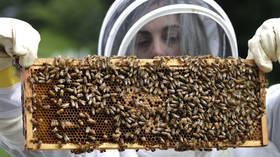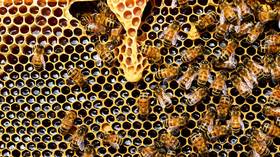US approves experimental bee vaccine

The US Department of Agriculture has granted a conditional license to the first-ever vaccine for bees, Dalan Animal Health announced on Wednesday. The Athens, Georgia-based company has developed an oral prophylactic they hope will be effective against a highly destructive spore-transmitted bacterial infection.
“Our vaccine is a breakthrough in protecting honeybees,” Dalan CEO Dr. Annette Kleiser said in a statement, suggesting it might “change how we care for insects, impacting food production on a global scale.”
American Foulbrood is a bacterial infection transmitted to bee larvae by spores. While antibiotic treatment can mitigate the impact to adult bees, US regulations adopted almost a century ago require the burning of an infected colony.
Dalan’s technology “uses a transgenerational immune priming approach,” using the queen to pass the immunity onto larvae before they hatch. In practice, the vaccine containing “killed whole-cell Paenibacillus larvae bacteria” is passed along by worker bees to the queen via the royal jelly, and ends up in her ovaries. The company claims that efficacy studies have indicated this “may reduce larval death” associated with the Foulbrood infections.
The USDA has given the treatment conditional approval for two years, the company said. While it was developed by Dalan, the vaccine will be manufactured by Diamond Animal Health, an Iowa subsidiary of Heska, a Canadian company specializing in blood diagnostic solutions. Dalan will be in charge of limited distribution to interested commercial beekeepers.
If the approach proves successful, Dalan intends to apply it to “other honeybee diseases and underserved industries, such as shrimp, mealworms, and insects used in agriculture.”
The company’s statement quotes Trevor Tauzer, board member of the California State Beekeepers Association, who called the vaccine “an exciting step,” noting that until now the only countermeasures available were costly and time-consuming antibiotic treatments that had limited effectiveness.
California accounts for almost half of all the US honeybee colonies, due to the high demand of the almond industry. Almond plantations in the state’s central valley provide an estimated 80% of the world’s supply, and require up to 30,000 colonies to be shipped there by truck every year during pollination season. The concentration has a downside, as bees can get poisoned by pesticides or catch infections from other swarms, requiring apiaries to destroy millions of insects rather than sending them back.












